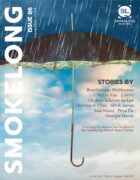This excellent piece is the first-place winner of SmokeLong’s Grand Micro Contest this year. Congratulations! Tell me about your reaction when you found out.
i was actually about to watch wicked when i read the email that i won, & i couldn’t help but think my win was somehow tied to my decision to watch a movie about magic. cause winning’s a type of magic, especially when you think about statistics & probability. i’m honestly baffled & honored that my work was chosen.
This is nonfiction, and you’re telling the story one person removed, as it was your sister who discovered this tragedy. Do you think this story changes if it had been you who made this discovery?
since this piece is creative nonfiction, i was just drawing from my life. i write a lot about the events surrounding my sister’s ex/my friend’s suicide. as such, i’ve been exploring what it means being a bystander to grief. in this case, my sister doesn’t really talk about the moment we found her ex dead because of the wounds it opens. but, being a person present for this tragedy, i wanted nothing more than for my sister not to experience this trauma. which is ultimately what this piece is about—it’s a gift i wish i could give my sister so that i could end her grief. that’s why the narrator’s at a distance because the true grief of this moment does not belong to the narrator. if i would have explored this moment with the narrator having a more active role, the story would have changed, as the narrator’s role would have shifted from observer to participant. & the narrator couldn’t just exist in a space of imaginings.
The story is centered around speculation, a lot of what if, a lot of should have. What is it about that stage of grief that seems particularly tragic?
i recently saw a tik tok a few weeks ago that said people focus so much on “what ifs” because it is easier to do that than to accept reality. these fantastical scenarios allow us to go outside of our grief/reality. which makes sense since grief’s often sobering & silent. with death, once someone is gone, you realize two things: 1) your grief will always have a future, & 2) there is no longer the possibility for a person to return to you in the way a living person can. that change in dialogue, in making a person past tense, is nothing but harrowing. so i think the “what if” stage of grief helps keep away the harsh truth of loss, at least for a while.
That last image of the story, which is referred to in the title, is absolutely heartbreaking and gorgeous at the same time. I wonder if you came up with that first or if you came across it as you ended the story. Would you mind sharing that part of your process?
i didn’t start with this line but rather found it when i started thinking about how to describe how death can take over our bodies. traditionally, we see in lots of literature dead bodies are synonymous with the color blue. that’s the initial image that came into mind when i started writing this piece. however, i think because her death happened through suffocation, i kept returning to air, & by proxy the sky, which coincidentally has the illusion of blue; it’s quality, at least. since the sky was probably one of her last sights, the image felt comforting to me because it made her death feel more like it was the result of a force of nature, rather than violence to herself.
You have another story that placed in the competition that’s appearing in this issue. Not a bad day’s work. What do you have cooking with all these micros you have written?’
i am working on a micro/prose poem collection, which explores this tragedy and the difficulties we have with continuing to live despite the pain of living. i have a full manuscript done that i’ve been sending out. i’m hoping it gets picked up soon. fingers crossed. pray for me.



 In its third year, The March Micro Marathon will be, as usual, a prompt-a-day whirlwind for 24 days. You’ll exchange drafts of micro fiction, non-fiction, and prose poetry in small groups and gather for a series of online events (all recorded for participants unable to attend live). We’ll finish with 3 competitions, and participants who are not already in SmokeLong Fitness will be invited to workshop with SmokeLong Fitness until the end of April!
In its third year, The March Micro Marathon will be, as usual, a prompt-a-day whirlwind for 24 days. You’ll exchange drafts of micro fiction, non-fiction, and prose poetry in small groups and gather for a series of online events (all recorded for participants unable to attend live). We’ll finish with 3 competitions, and participants who are not already in SmokeLong Fitness will be invited to workshop with SmokeLong Fitness until the end of April!